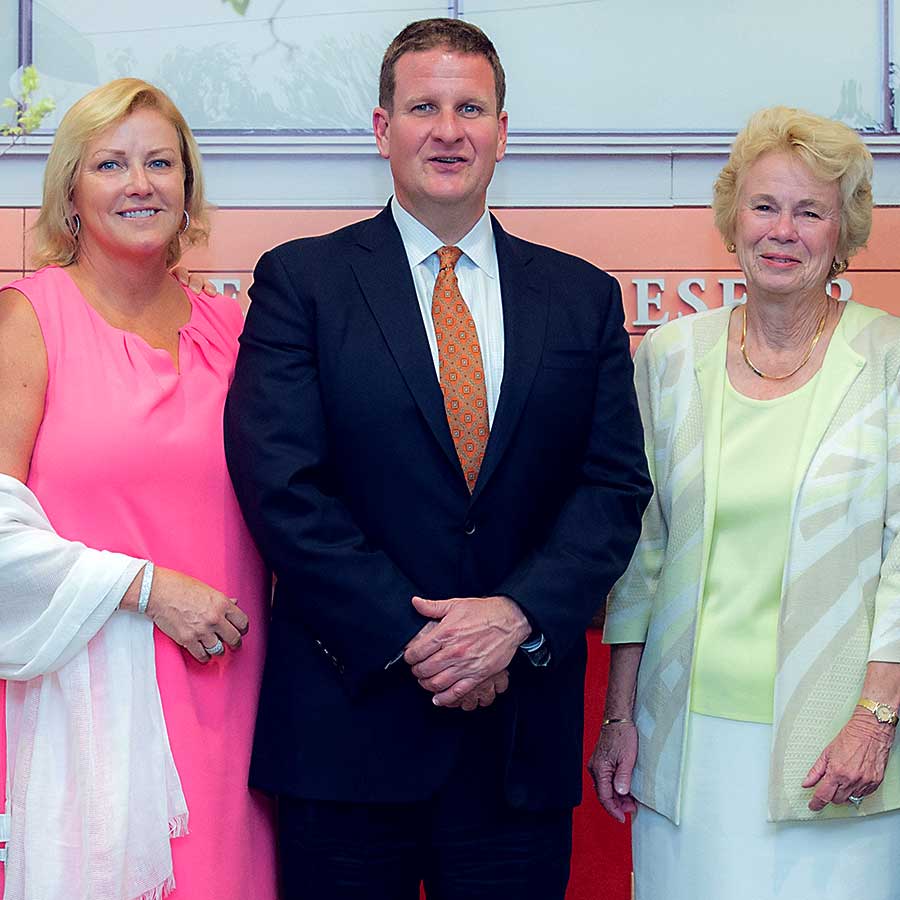$50 million to Dana-Farber Hale Family to Accelerate Pancreatic Cancer Research and Care with One of the Largest Single Gifts Ever to Dana-Farber Cancer Institute

Continuing their family’s deep commitment to conquering pancreatic cancer, Judith B. Hale, her son, Robert T. Hale, Jr., and his wife, Karen Hale, have pledged an additional $50 million to Dana-Farber Cancer Institute. This gift, one of the largest single gifts in the Institute’s history, will support the Hale Family Center for Pancreatic Cancer Research, founded in 2016 with $15 million from Judith, Robert, and Karen, and bring the Hale Family’s cumulative support to Dana-Farber to over $80 million.
This new gift will enable a wide range of ambitious work in two main areas of pancreatic cancer research: early detection and prevention, and precision medicine and biology. Currently a national leader in the field, the Hale Family Center for Pancreatic Cancer Research will launch teams of scientists to leverage health system data to identify those at highest risk for pancreatic cancer, detect it earlier through new imaging approaches and blood tests, and develop new treatments for pre-invasive and early invasive pancreatic cancers.
The center will also investigate the biology and interplay of pancreatic cancer cells, the immune system, and stromal cells, and develop a series of clinical trials to test new therapies based upon discoveries from these initiatives.
“Our intention is to substantially speed the pace of research and new treatments for this terrible disease,” said Judith Hale, a member of the Dana-Farber Board of Trustees. “We are investing in the exceptional talent at Dana-Farber because we are committed to finding a cure. That would be a wonderful honor for my husband and legacy for our family.”
“Working in partnership with the Hale Family, we have already made significant progress against pancreatic cancer,” said Dana-Farber President and CEO Laurie H. Glimcher, MD. “Yet far too many families are still devastated by this disease. We share the Hale Family’s bold vision to eradicate pancreatic cancer and save lives, here and around the world. With this incredibly generous, transformational gift, the Hale Family is providing us with an unprecedented opportunity, and responsibility, to do just that.”
“More than 60,000 people will be diagnosed with pancreatic cancer this year, far too often at a late stage,” said Karen Hale. “It is critical to detect it early when it is most vulnerable, and to have newer, more advanced treatments available when we do. Dana-Farber has the best team of scientists and clinicians to do this urgent work.”
This gift is in honor of Judith Hale’s late husband, and Robert Hale, Jr.’s father, Robert T. “Bob” Hale, Sr., a patient of the Institute, who died in 2008. Longtime supporters of the Institute, Robert Sr. and Judith Hale established the Robert T. Hale Sr. and Judith B. Hale Fund for Pancreatic Cancer Research at Dana-Farber in 2007.
The Hale Family’s commitment to research and care has continued across the generations. Judith Hale created the Hale Family Center for Pancreatic Cancer in 2012, and with Robert Jr. and Karen, established the current Hale Family Center for Pancreatic Cancer Research in 2016.
In addition, the Hales’ company, Granite Telecommunications, and its employees have supported research at Dana-Farber and other institutions by providing millions of dollars through corporate philanthropy and popular annual events.
“I am inspired by the Hales’ determination and commitment to the mission we all share,” said Josh Bekenstein, Chairman of the Board of Dana-Farber. “They are a model for others of the bold, forward-thinking philanthropy that has meant so much progress for patients throughout Dana-Farber’s history.”
“With this extremely generous gift from the Hale Family, we have an incredible opportunity to transform how pancreatic cancer is diagnosed and treated,” said Brian Wolpin, MD, MPH, director of the Hale Family Center for Pancreatic Cancer Research and the Robert T. and Judith B. Hale Chair in Pancreatic Cancer at Dana-Farber. “We share their deep commitment to ending pancreatic cancer, and the entire Hale Center team is exceptionally grateful for–and energized by–their trust and long-time financial support.”
The Hale Family Center for Pancreatic Cancer and Hale Family Center for Pancreatic Cancer Research includes scientists exploring germline genetics, functional genomics, chemical biology, computational biology, cancer metabolism, immunotherapy, and laboratory model system development, as well as clinicians specializing in medical oncology, radiation oncology, radiology, pathology, gastroenterology, and leadership of clinical trials.
This highly collaborative research environment has already had numerous successes, including: Contributions to the first approval of a targeted drug for patients with pancreatic cancer. Creation of a comprehensive early detection program for patients with inherited risk of pancreatic cancer that is a national model. Discovery of a new gene for inherited pancreatic cancer by studying pancreatic cancer-prone families. Detailed genetic studies that contributed to national guidelines that now recommend inherited genetic testing and tumor DNA sequencing for all patients with a new diagnosis of pancreatic cancer. Completion of the most comprehensive map of the pancreatic cancer immune microenvironment documented to date. Establishment of one of the world’s most advanced clinical trials programs for pancreatic cancer.

